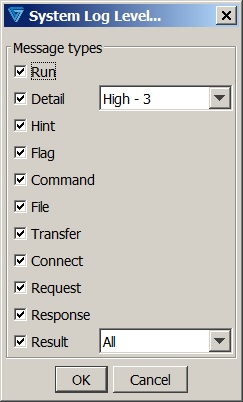In the web UI, go to in the menu bar. In the native UI, go to .
- System Message Level
- Indicates what level of detail messages should be shown in the messages pane.
Standard values pertain only to detail messages; customizing allows finer control of the level:
- System Log File
-
Indicates whether a system log file should be:
- continually appended to, or
- overwritten each time the Cleo Harmony, Cleo VLTrader, or Cleo LexiCom software is started, or
- not created at all.
- Replicate Log Events in Cluster
- Indicates whether any log event for any node in the cluster should be replicated across the cluster. The Cleo Harmony and Cleo VLTrader applications use a self-contained, distributed NoSQL database for this purpose. This option must be turned on for transfers and events information to be available through the REST API and, hence, the Cleo Portal and several of the newer UI reports (for example, Transfers and Logs).
- Compute CRC on transfers
-
Indicates whether a CRC-32 value should be computed on file transfers. If computed, a CRC value is recorded in the <Result> element of the system log file; and further, if database transfer logging is enabled, the CRC will be stored in the database as well.
Note: If special EOL processing is associated with the transfer (e.g., 'Fixed Record Outgoing Insert EOL' is on), CRC computations will take place after EOL processing on outbound payloads and before EOL processing on inbound payloads.
Note: This is a Cleo Harmony and Cleo VLTrader option. - Log errors and warnings in System Event/Syslog File
-
When the ‘Log errors’ selection is enabled, indicates that all errors and exceptions will be logged in either the Windows Event Log or the Unix Syslog. In Unix, messages larger than the size of the Syslog record entry will be truncated.
Additionally, logging of warnings may be selected but requires that error logging has also been enabled.
When enabled, System Event logging will be done in addition to “Email On Fail”. Suppression of repetitive messages used for emailing does not apply to System Event logging.
Note:On newer versions of Linux and Unix Solaris 2.6+, it’s possible that the remote Syslog capability was disabled and may require additional configuration. Refer to Knowledgebase # 2416 for further information.
This is a Cleo Harmony and Cleo VLTrader option.
- System Log Level
-
Indicates what level of messages should be logged to the system log file.
Standard values pertain only to detail messages; customizing allows finer control of the level:

- Automatically archive
- Indicates whether the system log file should be automatically archived when it reaches the maximum size.
- Archive daily or Archive weekly
- In addition to archiving when it reaches the maximum size, indicates whether the system log file should be archived at the end of every day or every week (Sun-Sat).